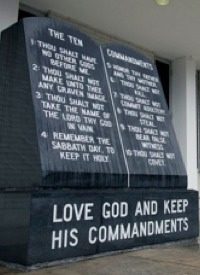
Anderson, however, did not count on the ACLU, which has made it a nearly exclusive campaign to denude the American landscape of all vestiges of its Jude-Christian foundation. His “simple thing” has become a high-profile court case as the ACLU has demanded that the federal judiciary force the county to remove the monument. The secular group is supposedly acting on behalf of a non-resident who claimed to be offended by the display. “I never in my wildest dreams thought it would come to something like this,” said Anderson of the conflict over his humble testament to America’s Christian heritage.
In July a U.S. district court in Gainesville ordered the county to remove the monument, parroting the secularist argument that it violates the U.S. Constitution’s ban on the establishment of a religion by government. Despite the fact that Anderson paid for the monument, donated it to the county, and received permission to display it in the public square, Senior Federal Judge Maurice Paul ruled that “the location and permanent nature of the display make it clear to all reasonable observers that Dixie County chooses to be associated with the message being conveyed. As such, the Court finds that the monument displaying the Ten Commandments is government speech and must comport with the Establishment Clause.”
Howard Simon, executive director of the ACLU’s Florida chapter, responded to the ruling with the admonition that “removing the monument is the right thing to do. It is not the business of government to promote religious messages about monotheism, idolatry, taking the Lord’s name in vain, or honoring the Sabbath.” In a final tweak to the residents of Cross City Simon said he hoped “Dixie County officials will find a permanent place for it at a church or other house of worship, which is the appropriate place for religious monuments.”
Dixie County, however, is not about to surrender its constitutionally guaranteed freedoms that easily, and with the help of the Liberty Counsel, a conservative legal advocacy group, is appealing the ruling to the federal Eleventh Circuit Court of Appeals. Matthew Staver, founder of the Liberty Counsel and dean of the conservative-leaning law school at Liberty University in Lynchburg, Virginia, noted that the county provides an open form that allows for such public displays as Anderson’s Ten Commandments monument. “Dixie County should be applauded, not sued, for fostering open and robust speech in a public forum,” Staver said. “Rather than take advantage of the forum, the ACLU prefers to censor speech with which it disagrees.”
Staver pointed out that the Ten Commandments are a universally recognized symbol of the law upon which America was founded, and can be found at courthouses and public squares across America, as well as in the nation’s very judicial center. “There are more than 50 depictions of the Ten Commandments at the U.S. Supreme Court, and there have been thousands of displays throughout the country for many years,” he said.
Of course, such reminders of America’s accountability to the Almighty are the very thing the ACLU has committed with steely resolve to destroy — and in the process, if possible, to demolish the nation’s spiritual foundations.
But if the folks of Dixie County have any say in the matter, that most assuredly will not happen. As the county appeals the federal dictum to remove the Ten Commandments monument, area residents and leaders have rallied around the display as a symbol of the faith they hold dear.
“This country was built on what the Ten Commandments represent,” State Representative Leonard Bembry, a Democrat from nearby Greenville, told an Ocala, Florida newspaper following a rally at the monument in late November. “It’s so important that we as Americans preserve this way of life that we have.” Of the ACLU’s case he observed, “It’s ridiculous that they would take a stand in Dixie County, because I don’t know of anybody in Dixie County to complain about that monument.”
Another public servant, Dixie County manager Mike Cassidy, who grew up in Cross City, told USA Today: “No one in this county has come forward and said, ‘this should be removed.’ It has been totally unanimous.”
Even those who may not agree with the monument’s sentiments appear willing to defend the rights of those who do, and are rightly irritated by the ACLU’s intrusion. “If I look at things I don’t like, I just look the other way, grit my teeth and go on,” one resident told CBN News. “But I don’t want to sue anybody or cause a commotion.”
As for the ACLU’s demands for the monument’s removal, one local resident voiced the sort of defiant patriotism that was once common in the heart of Dixie — and elsewhere across America. “There will be people standing around it to protect it when they come to remove it,” Donald Eady of neighboring Old Town, told USA Today. “The people here enjoy it. We should have that freedom, but they’re taking our freedom away daily.”
Horatio Mihet, the Liberty Counsel attorney representing Dixie County in the case, explained the heritage of freedom that has inspired Americans for over 200 years. “Our founders understood that freedom is not just some privilege that a government can give and take away from you at its pleasure,” he said. “They knew that freedom is an unalienable right coming from God the creator and that no one can take away from you. That means no government, no politician, no lawmaker, no judge — and certainly not the ACLU.”
Photo: AP Images



